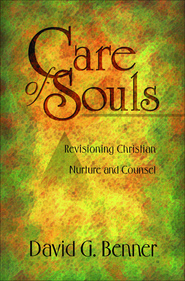 Significant elements about the practice of soul care. The most important place to begin Soul Care is with God's revealed knowledge about man, which, according to scripture, is holistic, viewing man as one with many parts (53). Man is thus an integrated whole of which soul, body, and spirit reflect aspects of, so Man is an “embodied soul,” or an “inspirited body,” not a spirit animating flesh (22). Soul Care must therefore treat all three aspects of man, lest concern for the whole person be neglected (23). This is often times the failing of modern psychology, since “humans have often been stripped of all that made them distinctively human” (55) and seen as nothing more than a compilation of behaviors and models. Therefore, Benner asserts two aspects to Soul Care: cure, as “the response to the need for a remedy for sin”; and care, as “assistance in spiritual growth” (28) as they play out via various forms. Interestingly, Benner affirms that psychotherapy “is little more than repackaging of religious soul care” (41) and psychology “has rightly been criticized as often being reductionistic” (67) since they merely strip out the supernatural and moral framework. Soul Care, and one that is inherently Christian, thus differs significantly from therapeutic psychology. In fact, the combination of the two has often been done poorly with “the syncretistic incorporation of models and technologies that are more clinical than pastoral” and thus “have often undermined the uniqueness of pastoral ministry” (39). However, this is not to say that either of these secular fields has nothing to offer, for “our relationship with the Divine is mediated by the same psychological processes and mechanisms” used in daily life (110). Thus, a psychospiritual approach needs to be adopted that doesn't separate spiritual and psychological aspects of the human whole (110). However, in focusing on the spiritual inner life of the individual, it is important to recognize that not all spirituality is Christian. There is nonreligious spirituality, religious spirituality and then finally Christian Spirituality (89). Benner describes nonreligious spirituality as the most basic “quest for self-transcendence and surrender...” yet failing to recognize the ultimate significance of this desire. Religious spirituality focuses the quest for self-transcendence and meaning on a relationship with a power or being. Finally, Christian spirituality finds the fulfillment of these basic yearnings “within the context of Christian faith and community” (90) and ultimately the power of the Holy Spirit. Impact on processes and goals for counseling. From this foundation of Christian spirituality, Soul Care will take different forms as individuals naturally experiencing God in different ways. As such, the unique combination of the kataphatic vs. apophatic techniques for spiritual growth (91) and speculative vs. affective focus of the techniques (92-93). More imaginative individuals would use the kataphatic approach to “identify positive images of God and use these images as a tool for meditation” (91) while others might use the apophatic approach to focus on the greatness of God by what he is not, thus “encountering God as mystery” (92). These techniques can then be focused on encountering God with the mind (intellect) with the speculative approach, or the heart (emotions) with the affective approach. Dialogue is affirmed as the superior means of Soul Care amongst all the forms of verbal interaction (133) since it “is more than advice giving, information exchange, or communication” but “exploration and discovery through conversational engagement” (131). While this form is often the most challenging to maintain since it demands authenticity and reciprocity, it allows for Soul Care to be conducted by anyone who truly cares the for individual, not just specially trained professionals. Benner also provides a unique contribution on dreams (seeing them through the lens of biblical times) as coming from God with the purpose “to help us know our innermost thoughts” (158). Dream journaling can be an effective way to understand messages of the soul (163). Benner concludes with the many forms Soul Care can take ranging from family and pastoral care to psychotherapy and intensive soul care, but stresses that providers should experience each form.
1 Comment
|
AuthorBrett Yardley: Categories
All
Archives
January 2019
|

